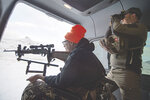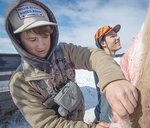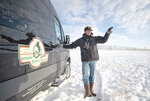Clear, 75° F
Father and son Charlie and Brodie Ziska were preparing for the Saturday morning hunt well before sunup. It snowed the night before — the first real blast of winter. Their push down Southfork …
This item is available in full to subscribers.
The Powell Tribune has expanded its online content. To continue reading, you will need to either log in to your subscriber account, or purchase a subscription.
If you are a current print subscriber, you can set up a free web account by clicking here.
If you already have a web account, but need to reset it, you can do so by clicking here.
If you would like to purchase a subscription click here.
Please log in to continue |
|




Father and son Charlie and Brodie Ziska were preparing for the Saturday morning hunt well before sunup. It snowed the night before — the first real blast of winter. Their push down Southfork Road, Brodie in a stout ranch truck and Charlie piloting the Wyoming Disabled Hunter’s all-wheel-drive van, was going to be slowed by the ice- and snow-covered trail.
Charlie has spent most of his career managing area ranches and knows the South Fork of the Shoshone River and the surrounding ranch land well. He graduated from Cody High School, spent his youth chasing game in the area and volunteering for the Cody Volunteer Fire Department until being named administrator at Powell’s Park County Fire Protection District in May.
For the past decade he’s been volunteering for the nonprofit hunting organization founded by area residents with the mission to make a difference in the lives of outdoors enthusiasts with disabilities. At first he’d come out to help process game harvested by clients, but then started leading hunts for those with a wide range of disabilities, including paralysis. Brodie has been in tow on volunteer trips for the past few years, helping out where he could at first before becoming a certified companion hunter this year.
Brodie could have been leading a hunt of his own, but he was needed to help get a quadriplegic hunter on an elk. It was going to be a challenge and the two, along with volunteer Myles Haines, would need to be on their games — as well as having a little luck — to be successful.
The hunter
A decade of patience finally paid off for Scotty Rae Hettinger. He was designated an alternate for this season’s adventure with the organization and, when one of the 20 available spots suddenly opened, he found himself pressing west from southwest Missouri to Wyoming.
Hettinger was on the road for nearly 24 hours, 18 behind the wheel. He knew landing a spot for a guided trip by top guides with special training and equipment to handle severe disabilities in the field was a rare opportunity. The avid outdoorsman was determined to make it to Cody despite the sketchy weather.
Wyoming Disabled Hunters received 114 applications for the 2023 season, a record for the program that first offered hunts for disabled outdoors enthusiasts in 2009, said organization president Terry Skinner. Hettinger applied each year for the past 10 and was beyond excited to finally be heading to the Cowboy State for an elk hunt.
The wind in Nebraska was bad, pushing his van around. Then it rained so hard visibility was limited. By the time he arrived in Casper his body and spirit were wearing down. That’s when he experienced what many Wyoming residents already know to dread; treacherous winter conditions all the way to Shoshoni, through Wind River Canyon and on to Bull Moose Retreat on the South Fork.
By the time he arrived he was too sore to make it to the group dinner that night, missing the traditional photos and introductions with the other seven hunters. Some worried the trip might have been too much for Hettinger, but there’s a lot of fight left in his 52-year-old bones.
Hettinger was “an Army brat,” he said. His father, Jess Webster Hettinger III, was his hero. In 1983, after more than a dozen years as a combat engineer, he developed leukemia. The disease took him quickly, dying in 1986 when Scotty was just 15.
That’s when Scotty first took to alcohol and drugs.
Despite his vices, the 6-foot-5-inch student managed to excel in basketball, eventually earning himself a scholarship to play at a private college in Des Moines, Iowa. But there would be a heavy toll to pay.
The accident
During a night of drinking, Hettinger was involved in a slow-speed accident. His roommate at the time was driving Scotty’s 1968 Ford Mustang erratically after a party and hit a parked car. A victim of whiplash, Hettinger soon realized he was unable to move.
“All I could see were my feet. I was like, why can’t I get up? It was like somebody was pushing me down,” he said.
The last thing he remembers from the accident was warm blood rushing from his head and onto his face before he blacked out.
The whiplash broke his neck at the fourth and fifth cervical vertebrae and left him paralyzed. There were times when Hettinger didn’t think he would make it. He thought about ending it all several times, he said. At one point he pleaded with his mother to unplug him and let him die.
Then, while in physical rehabilitation at Craig Hospital, a leading Neurorehabilitation Center in Colorado, he found a new lease on life. He was sober and unwilling to quit despite losing the mobility he knew as an athlete.
Just two years earlier he had averaged a double-double in his senior year at Carthage High School.
“He was as tough as there was,” Dan Armstrong, Hettinger’s coach at Carthage, told a local journalist in 2014. “The more you told him he couldn’t, the more he did it.”
Shortly after the accident he regained some mobility in his shoulders and can now use his arms, though limited. He went back to college, graduating from Missouri Southern State University in nearby Joplin and became a teacher and, eventually, a basketball coach.
“People have a hard time believing this, but the accident was a blessing — it put me back on the straight and narrow,” he said. “I was on a path of destruction.”
After moving through the ranks as a coach, the head coaching position at Carthage High opened up and Hettinger applied. He was passed up for the job so decided to move on and started the Midwest Mission, a youth basketball program in Webb City. There he coached thousands of players for 14 years while also remaining as a social studies teacher at Carthage High.
In 2017 he launched Charlie 22 Outdoors, a program to provide outdoor activities to our nation’s veterans and their families with the goal of showing them there is hope, love and a personal meaning in God’s grace.
“The PTSD and demons they face are very real. Unfortunately, far too many are succumbing to the battle,” he said.
The name of the 501(c)3 comes from the average number of veterans lost per day to suicide. Though he was never able to serve, his memories of his father — along with his life story and teaching experience — made him a natural for helping veterans facing crisis.
The hunt
As the team pulled off the road and onto a small overlook of the river valley below, the snow cast an icy blue hue in the predawn hour. A herd of hundreds of elk in a tight circle were grazing on recently cut alfalfa at the base of dramatic Absaroka Mountain peaks, erasing all memories of the chore getting there.
Finding the herd was heartening, but getting into position without spooking them was going to be difficult. It was an oddly calm morning. Had there been a breeze, Charlie said he would’ve had a better idea which way the herd would move should they get spooked by the encroaching black van.
The three guides gathered and devised a plan before heading into the valley. After crossing a small bridge, they entered a private ranch that had previously given the organization permission to hunt the land. The group has been fortunate enough to rely on the kindness of landowners in the Basin for the access they need to make the most challenging hunts successful.
Hettinger would need to be in his chair equipped with a special rest for his .30-06. He had a permit from the Wyoming Game and Fish Department only available to disabled hunters to be able to shoot from inside the organization’s van. He planned to take aim from the rear of the vehicle with the large, hinged doors swung open. But there wasn’t a road leading to the elk and success would require off-roading in the surprisingly tough Mercedes Sprinter van.
The purchase of the van was made possible by donations from the Paul Stock Foundation, the Wyoming Outdoorsmen and the Park County Recreation Board. It not only has the space to easily transport disabled hunters and their chairs, but it also gives the guides the head space to comfortably assist hunters. But one thing for sure, it isn’t inconspicuous.
The team dropped off the ranch truck and headed out into the fields below a slight hill, keeping their movements hidden from the herd. At every turn Charlie would jump out and sneak to the top of the rise to gauge how the herd was reacting to their moves and attempting to figure out how to back the van into a position for a shot.
The fresh snow hid rocks and ruts, but they pushed on. Ziska finally swung the rear doors open and put the van in reverse, saying “Get ready, we’re going to need to be quick now.”
Then a shot rang out. A nearby hunter not with the group had taken a shot and the herd was on the run. Hettinger tried to get in position, but it was too late. They watched the herd head into the nearby hills, out of reach for the team. Then something odd happened.
The herd turned around and returned to the field, surprising the team who just moments before were dejected thinking their opportunity had passed.
“I did not expect that,” Ziska said.
They reset after a bumpy move to the other side of the hill, the doors still wide open. Ziska got the van lined up perfectly and Hettinger once again was in position, thanks to help from Haines.
Hettinger is able to get a finger on the trigger, but unable to squeeze like you are taught during target practice before your first hunt. Instead, as he was zeroed in on a nice cow, he placed his finger inside the trigger guard and pulled his arm back to fire. The shot was off, just over the cow’s back, and now the herd was moving again. Hettinger was embarrassed, he said, but there was no time for apologies — not that anyone on the team would even think to judge him. Eventually he was able to line up another shot and dropped the beautiful elk.
The smile on his face after the shot said it all as the team quietly celebrated success.
“I can’t believe it,” Hettinger said repeatedly.
He smiled so much his cheeks were hurting. And, in seeing Hettinger’s absolute joy, the volunteers hearts were warmed — the ultimate payoff for volunteers.
A years-long effort
The volunteers can only offer the experience, not guarantee success. That said, they have a very high rate of harvest with few hunters leaving Cody without meat for their freezer. Yet, that success isn’t made in a couple weekends of work, Skinner said.
The organization was founded by Powell resident Merlyn Ballinger in 2008. Skinner has been the president for the past three years, working year-round to get all of the many moving pieces in place to make the events seamless once the hunters arrive.
Current Game and Fish commissioner Ashlee Lundvall recruited Skinner to the charitable organization after he retired in 2015. Starting as a board member, he quickly learned the ropes from longtime president Corey McGregor and now starts planning a new year of hunts almost immediately after the current year’s hunts are finished.
The group is funded by donations, one of the largest being donated commissioners’ tags (including from Lundvall) that they auction off to the highest bidder. Their goal is to make the hunt as affordable as possible for their guests. Their stay and food at the Bull Moose Retreat is covered, thanks to dedicated donors and years of assistance from retreat owners Rick and Linda Hordichok.
“As soon as we found out about them (16 years ago) we wanted to know if they were interested,” Hordichok said. “They’ve been a blessing to us.”
Most of the deer, pronghorn and elk tags are donated to the hunters. Through a Game and Fish program, volunteers for the organization apply for tags and then turn around and donate them to hunters selected for the program.
Dozens of volunteers line up the hunts, seek permissions, repair equipment and prepare home-cooked meals for the hunters — all seeking the joy of helping others who might not otherwise have a chance to hunt in this bucket-list part of the Rocky Mountains.
Ziska isn’t the only father handing down his spirit of community service to the next generation. Todd Legler has been bringing his son to the seasonal hunts since joining the group as a guide in 2009. Now his son, Andrew, has also been certified to be a companion hunter and, unsurprisingly, is great friends with Brodie; both are students at Cody High School and avid hunters.
For the past few years the boys have battled for bragging rights afield. But now, as both are following in their fathers’ footsteps as companion hunters, the competition has turned to the advantage of hunters with disabilities.
“The boys have a little competition going on. [Todd and I] are too old for competitions,” Charlie quipped, explaining the real joy is in service. “I get more joy out of taking the disabled hunters than I do for myself. Same thing with my kids; I get more joy watching the kids succeed. It’s important. If you don’t hand it down, it’ll just die.”
For more information, visit wyomingdisabledhunters.org.